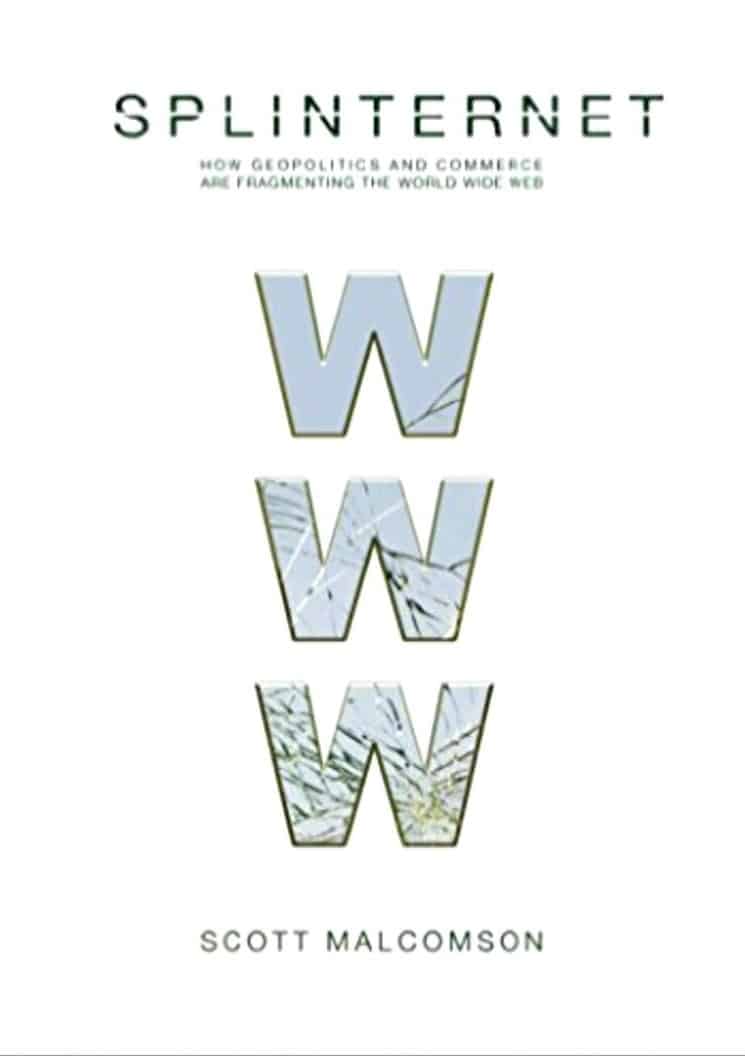World Geostrategic Insights interview with Scott Malcomson on the Splinternet, or the fragmentation of the Web into disparate realms controlled by countries, political blocs, or any other controlling power, its consequences, and how geopolitical tensions and supply chain disruptions are driving globalization.

Scott Malcomson is an author, political-risk advisor, and former journalist, government official, and NGO official. He is director of special projects at the Strategic Insight Group and he has been a fellow at New America and Carnegie Corporation. He was foreign editor of the New York Times Magazine and contributor to the New York Times, the New Yorker, the Guardian, The World Post and many other publications. He has been an executive at two global NGOs and a senior official at the United Nations and the US State Department.
– In your book “Splinternet: How Geopolitics and Commerce Are Fragmenting the World Wide Web,” published in 2016, you delved into the issue of the splinternet, or the fragmentation of the web into disparate realms controlled by countries, political blocs or any other controlling power, such as technology or e-commerce companies. The book seems very relevant to the present day, not least because of Russia’s war with Ukraine, which is accelerating splinternet with the detachment of the Russian Internet from the global one (as China has already done). Do you think there is still a chance for a free global Internet to survive? Or should we prepare for an Internet divided by geopolitical boundaries?
The current global Internet infrastructure was designed with a goal of avoiding state capture. Part of that was to cede, outside of prosecuting certain crimes, the content sphere: the Internet community would not police global speech. The Internet as such was designed to be content-neutral. That fundamental structure has not changed. What has changed is two things, mainly: the increased ability (the desire was always there) of states to control Internet content within their borders; and the willingness of companies, especially those states’ own domestic companies, to help them control it. The reshaping of the Internet, like the early development of the Internet, is very much a private-public partnership. Internet companies are increasingly being held responsible by states, often under pressure from citizens, to take more responsibility for content and the uses of data.
This is by no means limited to China and Russia. American companies are responding to US state insistence on regulation of content (hate speech, political propaganda, disinformation) and law-enforcement access to information; European companies respond to states’ insistence on certain kinds of privacy, and so on. Democracies themselves are pressing for greater state control on the Internet. So we should definitely prepare for an Internet divided by geopolitical boundaries. To a great extent that is what we already have, although the boundaries are not in the technical structure of the Internet itself. They are in other layers: data centers, global positioning systems, apps, device hardware and software. Most states today, regardless of their political stances, are for greater state control over citizens’ data – “Internet sovereignty,” as Xi Jinping likes to say – and are increasingly able to enforce it.
– The Internet is perhaps the most visible aspect of globalization and in many ways has been its driving force. Could the emerging splinternet be considered a consequence and the main visible feature of a deglobalized world? What will be the consequences for network security? Could cyberattacks increase exponentially and the web become a weapon to be used in geopolitical confrontation?
A mild form of splinternet – a rebalancing of the relationships among communications data, state sovereignty, state security and technical innovative capacity, trending toward greater state control – was probably inevitable. The U.S. held all the Internet cards in 1995, so much so that even the U.S. saw that such a monopoly was not sustainable. (The big US Internet companies thought or hoped their own, private monopolies might well be sustainable, but they know better now.) What is striking is not that the Internet is being divided but that so much of it survives intact. I think that the core Internet is likely to survive, mainly because all the major players are deeply involved, for their own prosperity, in the globalized marketplace that the internet makes possible. In particular, it is very difficult to see how China, with its restrictions on capital mobility and demographic plateau, could deglobalize and remain prosperous or even stable.
However, the movement now is precisely toward techno-economic blocs, which represent a halfway-house for deglobalization. China’s ejection of Google and creation of the Great Firewall marked the beginning, but the Trump administration’s “clean networks” idea solidified the global pattern. Now China, above all, but also other countries were going to be pushed out of core networks of the US and its allies in order to keep those networks secure or “clean”. Trump was building on older policies, most prominently the US’s long-standing distrust of Huawei, but his administration really pushed the clean-networks idea much farther. Trump brought on some reluctant Europeans and Asians, and the process has continued under Biden. Today Canada, most of Europe, Japan, Australia, and some others are pretty much on board. China and Russia are on the other side. Some states, like India and Singapore, Israel, and to a degree South Korea, try to play a middle game – and more luck to them, by the way. Much of the rest of the world is up for grabs.
So, from a geopolitical point of view, the splinternet is partly a question of individual state policy for Internet sovereignty, and partly a question of major-power alliances around clean networks.
Network security is a complicated problem, to say the least. In some ways, it will probably improve, in the specific sense that individual states are developing cyber capabilities in order to protect their networks and thereby their other infrastructure as well, since there isn’t much infrastructure that is entirely off-network (by which I mean it is entirely inaccessible from the Internet). But the temptation to use the Internet for political intervention beyond your borders is pretty irresistible and always has been. It was just less obvious for a number of years because the interventions were mainly espionage.
Ironically, one of the main reasons for relative network stability has been that networks that can’t let anything in – that are completely safe, in theory – can’t let anything out either. Interdependence creates stability as well as vulnerability, it’s just never a static balance.
– Megatrends, including geopolitical tensions and supply chain disruptions, are shaping the future of global trade as multilateral efforts diminish. Has globalization passed its apogee? Is de-globalization inevitable? Will it become the New Normal? What main characteristics will it take on?
My view is that deglobalization is fundamentally driven by two things: a reaction against the mobility of capital that was accelerated by the Internet (as well as by containerized shipping and other factors); and the U.S. -China conflict, which is a decades-old power struggle but also a genuine fight over values, mainly the values of an open society and an open economy. With new approaches to offshore accounts, electronic-transaction taxation, and the like, there is an evolving policy response to capital mobility, and all the moves toward reshoring, friend-shoring, etc. are also brakes on capital mobility. The U.S.-China conflict could likewise be mediated and mitigated, of course. If these two causes of deglobalization are reduced, then deglobalization should also be reduced. Deglobalization isn’t inevitable. The U.S.-China conflict does seem like it will continue for many years, however, so for that reason alone deglobalization is likely to remain with us as well. Globalization created vulnerabilities, notably including network vulnerabilities, that certain powers just couldn’t live with any longer; deglobalization is a way to ameliorate those vulnerabilities.
However, those same powers – principally China, the US, Russia, India, and to a degree the EU – do not want to impoverish themselves. They need much of what globalization provides in order to continue growing. That’s why we have arrived at the techno-economic-security “halfway house” of alliance blocs or network blocs that I mentioned earlier. Of course, our era resembles all too well the imperialist revival of 1890-1914 and the collective destruction of the first globalization that followed it. At the least, our emergent “system” does not look very stable.
Malcomson is director of special projects at the Strategic Insight Group and he has been a fellow at New America and Carnegie Corporation. He has worked as a journalist and author in Africa, Asia, the Middle East, Europe, and North and South America. He was foreign editor of the New York Times Magazine (2004−11) and a contributor to the Times, the New Yorker, and many other publications. He has been an executive at two global NGOs and a senior official at the United Nations and the U.S. State Department. He is a member of the Council on Foreign Relations and PEN.
He is the author of Tuturani: A Political Journey in the Pacific Islands (1990), Empire’s Edge: Travels in South-eastern Europe, Turkey and Central Asia (1994), One Drop of Blood: The American Misadventure of Race (2000), Generation’s End: A Personal Memoir of American Political Power after 9/11 (2010), and Splinternet: How Geopolitics and Commerce Are Fragmenting the World Wide Web (2016). He provides political-risk intelligence and communications advice to individual and institutional investors and several Fortune 500 companies.
Scott Malcomson twitter account: https://twitter.com/smalcomson








